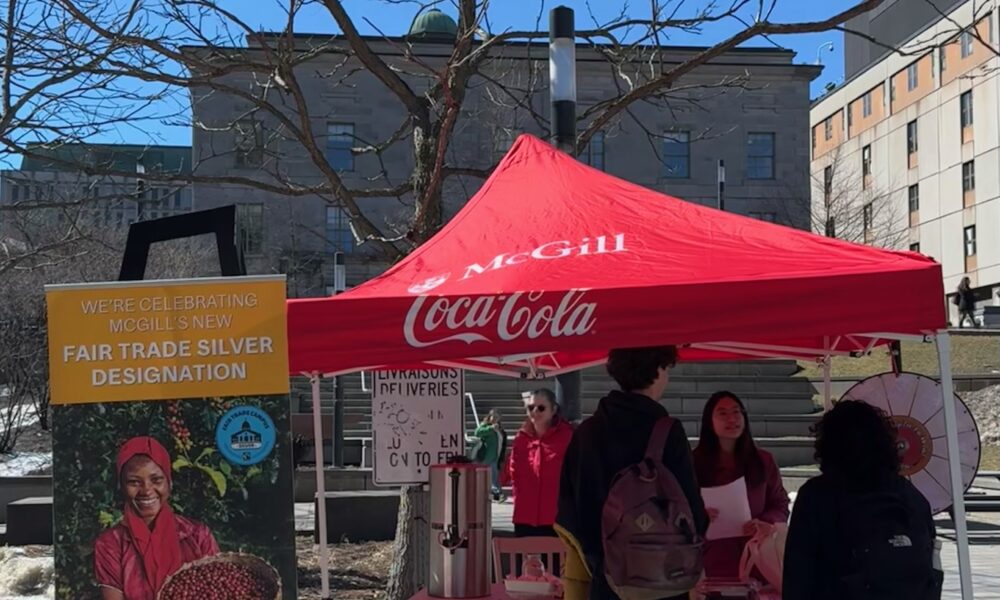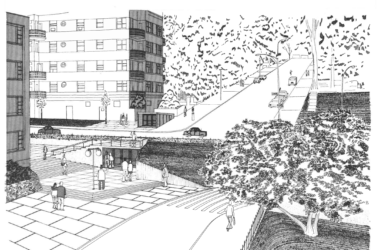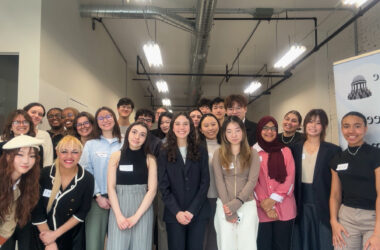A variety of tabling events often take place on campus, each aimed at promoting and raising awareness for diverse causes. On March 27, The Tribune spoke with the Fair Trade tabling event organizers outside the McConnell Engineering Building. The information booth, identifiable by its red tent and “Spin the Wheel” game, offered chocolate and coffee to participants.
The event was organized to educate students about McGill’s Fair Trade Campus designation and to raise awareness of the real-world implications of fair trade practices.
“We are trying to educate students on how fair trade helps farmers in developing countries fight climate change,” Goktug Bender, sustainability coordinator at McGill Student Housing and Hospitality Services, explained in an interview with The Tribune.
Bender elaborated on how Fair Trade establishes a minimum price that every retailer or buyer must pay, in addition to a Fairtrade premium. This premium is paid to farmers above the minimum price and is designed to help communities invest in sustainable development for their local organizations.
“We basically invest in them by building infrastructures or having initiatives and investments in their communities and buildings,” Bender stated.
Zach Suhl, associate director for McGill Food and Dining Services, delved into the challenges farmers face in the context of climate change. He pointed out how larger companies often fail to implement tangible initiatives to ensure producers get a fair value for their products.
“For example, bananas have had the same price for many years compared to everything else,” Suhl explained. “Our consumption habits are generally always looking for something cheaper to the point that we need to ask ourselves: How is it possible that a banana from Costa Rica can come here and only cost 39 cents? You need to ask yourself who is getting paid to produce this and who is being paid to take care of this.”
Suhl also emphasized the need for purchasers to be conscientious when buying goods, as price discrepancies reflect the underlying issues farmers face when making profits for their businesses.
“The minimum price established by Fair Trade helps farmers purchase more tools and technologies to fight climate change,” Bender added.
This is increasingly important, as modern technology is a key implement for farmers to address new and unpredictable weather conditions in a changing climate.
In addition to Fair Trade, Suhl made suggestions for how McGill students can particularly contribute to this cause. His first recommendation is to be aware of these global trade dynamics, and be critical of low prices of goods.
“I think that students should be very selective in their purchasing. If they are at a [shop] that is not selling fair trade products, it would be good to inquire as to why, what are the issues, why are they not able to carry out fair trade,” Suhl proposed.
Calling on students for more collective awareness, in turn, leads to their second objective, which is to make selective purchasing decisions. Suhl and Bender encouraged students to act on their knowledge of the Fair Trade impacts on farmers.
“Yes, everyone has a limited amount of disposable income, but the best way to support these initiatives is through your own pocket,” Suhl said.
The Fair Trade tabling event reminded students that everyday choices—like questioning prices or choosing fair trade—can have a real impact, especially on small farmers who already face the obstacle of surviving against the competition of massive agricultural corporations. With greater awareness and intentional purchasing, students can support more just and sustainable systems, on campus and beyond.









